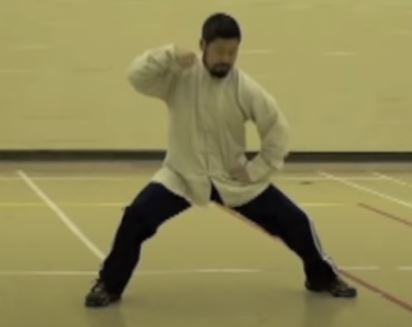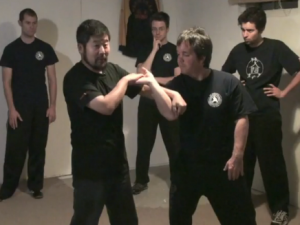…one of the messages I hear, daily, from GM Zhonghua Chen is that he wants us to use our head as much as we use our body…
I am one of the cursed, lucky few, in Edmonton. We are trying to get the most out of GM’s presence in our midst. He has made the Edmonton studio his central office during these crazy Covid times. Almost every regular Edmonton student is trying to leverage this learning opportunity. Many are volunteering to support the operation with extra time and effort. I have been fortunate to be able to help out with the Zoom classes and in some other ways. It means I am spending time, several days a week watching GM teach. One of my genetic brothers said to me over the phone last week that, “Doug, man, you need your head read, again, you’re volunteering?”. I told him yep, I am the one getting the ‘deal’ here. I get to absorb his teachings, make notes, ask him questions, observe his body movements, watch him use PM to move student’s body’s around with apparently no observable effort; in short, I get an opportunity to learn. I only have a limited amount of time to learn this art as best I can. I am 65 years young so, like all of us, there are no guarantees of how much time fate will offer me. I have ‘girded my loins’ to try to make the best use of this ironic gift of the fates. Part of that girding involves working as hard mentally as I do physically.
I hear GM urging all of us to take a closer look at how we engage in the study and practice of PM. His messages speak to our collective, and it seems to be almost all of us, inability to focus on his instructions ‘in the moment’. GM makes it clear that to progress in this art our minds need to develop as much as we develop our bodies. GM says repeatedly that we all fail to be present enough to eliminate from our minds the lessons of previous instructions and just listen/observe what is on offer currently. GM also says, again in many different ways, that we need to develop the mental capacity to have ‘mind intent’. He also keeps at us about having a more martial attitude in our practice, in class, and in our individual training.
I think he is asking us to take this art much more seriously. This art is martial, full stop. Health improving side effects of the art can never replace the historical raison d’etre (hope I got that right) of PM. To survive and thrive in mortal combat is the only reason for PM. There are no dance moves in PM. He is modeling for us that we should be making our minds as powerful a weapon as we are trying to make our bodies. Think for a moment about how focused western boxers are when sparring and fighting. If they let their attention waver they can end up with leather for lunch as repeated assaults of fists will fill the hole in their focus. They soon learn to create what I call a ‘fighter’s focus’. I have engaged in boxing and kickboxing. I have some scars where my focus faltered. I learned that to avoid getting hit I needed to pay close attention to my training partner or opponent. I learned that mental acuity assists me in the pursuit of increased knowledge and ability.
If you find it difficult to be ‘in the moment’. If you find it challenging to be able to narrow your attention sufficient to block out any and all extraneous inputs into your noggin’ during GM instruction. If you need to work on developing the mental muscle to match your physical ability then talk with your teacher. Ask questions in class, also before and after. Begin to take notes, now, don’t wait for perfection. Like PM practice learn by doing. If you are already mentally tough enough to take the ‘slings and arrows of outrageous fortune’ in the guise of your local teacher as they criticize your inability to move correctly for the 20th time in class, then good. That’s a start. Invest in learning how to take good notes. Invest time and money. Invest in tuning up your psycho-emotional self. Courses in being present might help. Read and write about PM. Engage your classmates and brothers/sisters in discussions about the art. I think we have to accept our part of the learning contract with GM. Our part is to work on our instrument. Our instrument is not just physical.
You can begin by not just reading this missive. Let it make you angry, I can take it. Let it motivate you to prove me wrong. Write comments on this or other articles presented. Get your brain in gear. Can’t learn PM by just getting the body to change. Re-setting my body to be able to manifest Peng involves as much mental work, and pain, as does my physical transformation. My spinal arthritis (ankylosing spondylitis; AS) forced me to take some heavy pain meds for years. Part of learning this art involved my ridding my body of opiates so that my brain, and body, could work better. I had to make changes to maximize my chances of successfully studying and practicing this quintessentially difficult martial art. If you are already on the road to having a mind as deadly as you would make your body then share that by taking the risk to write. Looking foolish on paper is just as hard as getting used to feeling foolish in class. You wouldn’t still be a PM student if you couldn’t manage learning from mistakes. This is just another task GM has given us all. PM ability is our prize. Lifetime effort is the price. Make a start.
…learning to live a breath at a time…



{ 2 comments… read them below or add one }
Thank you for sharing this piece, Doug.
I have realised that studying an art that does not have a structured skill ranking required me to accept that my teachers and our Master is also growing, evolving, and coming into new realisations each day. The way they teach us something one day could be explained or demonstrated in a different way as their understanding and skills improve. Go with it. We are not meant to challenge this change. We have to let it challenge us.
Before I started with the Practical Method, I read everything I could. I tried to learn about the people and the history and the teaching of Taiji. I read every magazine article I could find.
When I started learning the Practical Method, I thought I knew something. I thought I had an idea of what Taijiquan was, what it meant, and how to practice it.
After I started learning the Practical Method, I found I wasn’t following all the directions. I thought I was, but there was a translation and interpretation going on. I decided to stop using my head, stop reading, and stop thinking about Taiji. I decided to practice without thinking about it. I think it helped clear my head of other stuff and let me just pay attention to Master Chen.
Then I took a hiatus. Practice was minimal. And now as I return, I see value it using my head again, but now, I can fill it with the Practical Method and, hopefully, have very little other stuff to complicate my listening and my resulting practice.
I think everything you wrote is true, especially writing without fear of being wrong. If something is wrong, there should be comments to correct it, so we can all learn. This is another of my goals, so I’m glad to see it reinforced here.